Michelle Worthington's Blog, page 24
November 4, 2015
Discover your unique voice as a picture book author

We are each gifted in a unique and important way. It is our privilege and our adventure to discover our own special light. ~Mary Dunbar A ray of light from the sun is the cleanest, most perfect thing we can see with the naked eye. It can pass through a murky medium, but it still comes out as pure as it went in. The circumstances of you inner and outer life will change depending on the source of your inner light. What is your source of light? Use your uniqueness to create a picture book that reflects your talent.
Endless possibilities are yours if you will open your eyes and see them. It is time to awake to your priveledges and advantages. If you do not, and choose to stay asleep when you ought to be awake, to dream when you ought to be doing, you will miss opportunities and be caught in dangers that need a special wakefulness and watchfulness to guard against. When I started writing again after a long break, I had an unparalleled occasion to gain a vivid picture of what I had loved and what I had lost, uproot buried pleasures, lay sensible plans, stir my conscience and develop not only strength but skill as an author.
 Every now and then in our lives, something happens that reaches us, even if we are in a deep sleep of denial, a cry of warning from the world of realities and for a moment we are on the verge of waking. Then, when the emotions and turmoil has passed, we are tempted to go on living exactly as we have lived before. This was my chance to do more than just to turn, and mutter in my sleep.
Every now and then in our lives, something happens that reaches us, even if we are in a deep sleep of denial, a cry of warning from the world of realities and for a moment we are on the verge of waking. Then, when the emotions and turmoil has passed, we are tempted to go on living exactly as we have lived before. This was my chance to do more than just to turn, and mutter in my sleep.If you unhook the pendulum of a clock the works will keep going fast for a while, but they will soon run down. Draw on the power of your imagination to create a new pendulum for your life. There is a world of art, poetry, science, religion and philosophy to inspire you. If you are having trouble putting into words what you would like to create for yourself, consider your mind as a picture gallery where you keep images of what you want your life to look like. Remember, this isn’t about an unrealistic interpretation, this is just deciding to create something different. .
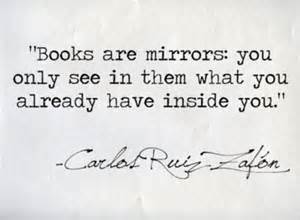
If you longing to do something worthwhile, increase your knowledge and understanding of whatever it is you want to do, and make it a priority in your writing. There is a limitless amount of opportunity in the world for people who are willing to have a go. Read the biographies of people you admire. The pages of history are the voice of real living people reminding us that “what man has one, man may do.” Great people in history may be described as those who have been great successes in the world, and those who have been equally conspicuous at overcoming great failure. Take comfort and encouragement in the fact that they had difficulties and overcame them, temptations and resisted them, were often weary and yet they never gave up the struggle altogether and were at one time too weak, yet they conquered in the end. Your life will begin to change when you stop limiting your thinking to what is possible. Nothing was ever done, and done earnestly and worthily, that was done with half a heart. On every side, the world bears the stamp of the thoughts and the genius of great men and woman in all the wonderful inventions we use every day. No great works were ever undertaken and brought to fruition by people who were only half hearted. Albert Einstein, the most prominent scientist of the last century was originally looking for a teaching position and he only took on a position at the patent office as an assistant examiner after two years of unemployment. He came to be regarded as the father of modern physics. Nelson Mandel, anti-aparthied activist and winner of the 1993 Nobel Peace Prize has been married three times and spent twenty-seven years in jail in his commitment to peace and reconciliation. While she was writing her multi-million dollar earning Harry Potter series, J K Rowling was trying to raise a child on her own, living on welfare payments while attending school. Not one of these people would ever have accomplished the great work of their life in the face of great difficulties and bitter opposition if they had gone into their work with only half a heart.
Talk soon
x Michellewww.michelleworthington.com
Published on November 04, 2015 09:00
November 3, 2015
How to Naviage the Oceans of Picture Book Publishing
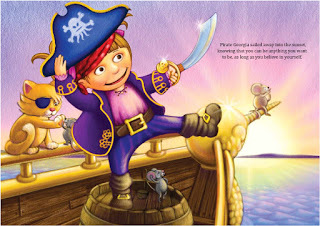 Christopher Columbus set sail with a ship, a crew and a star to guide him. Day after day, week after week, he headed west. Winds beat against his ship, seas were heavy and gales lashed down upon them, but still he headed west. His men threatened a mutiny, demanding for the ship to be turned back because they were lost, but still he headed west. He had a purpose, and point to prove and he didn’t get up on what he believed in. Finally, when he had lived his darkest hour, Christopher Columbus found his way to safe anchorage in the new land to be called America, changing the world as we know it.
Christopher Columbus set sail with a ship, a crew and a star to guide him. Day after day, week after week, he headed west. Winds beat against his ship, seas were heavy and gales lashed down upon them, but still he headed west. His men threatened a mutiny, demanding for the ship to be turned back because they were lost, but still he headed west. He had a purpose, and point to prove and he didn’t get up on what he believed in. Finally, when he had lived his darkest hour, Christopher Columbus found his way to safe anchorage in the new land to be called America, changing the world as we know it.Are you as sure of your purpose that you would have the courage to step out like that? It may mean crossing an unknown sea. You may go out into a life which has up and down experiences, but you may also become a guiding light and a blessing to others. The time has come when you may have to quit the harbour and sail for the open sea. But to launch out into your new single life, it can feel like you are embarking on a mission in a shore less ocean. It can be difficult to quit the land, let alone attain the end result or reach the goal. Nevertheless, you are duty bound to yourself and your family to attempt it.
The sea-worthiness of the vessel in which you propose to embark should be your first consideration. I have two divorced friends, both emerging authors, but who are completely different. My first friend is like a cruise ship, which after the storm finds fair winds and a prosperous voyage and comes gliding into harbour in the golden sunset of a summer evening to a fanfare of trumpets and streamers. The other, still driven by fierce gales, is a wreck of a vessel seeking only to cast anchor somewhere in safety from after the storm, regardless of the intended destination. Both these friends have weathered the same stormy ocean, but with very different results. Are you ready for the proposed voyage into publishing?
Talk soon
x Michelle
www.michelleworthington.com
www.michelleworthington.com
Published on November 03, 2015 09:00
November 2, 2015
Having Resilience as a Picture Book Author
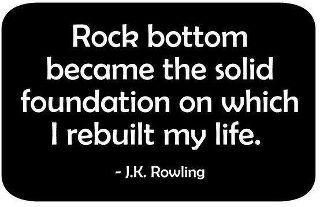
You may not get your book published the first time you send it to a publisher. When you do, you might not make a million dollars. Life is not designed to be easy, no matter how good or dedicated we are to being a professional writer. In order to bounce back from rejection, adversity and unexpected obstacles, it is important to stay motivated and enthusiastic.
The achievement of publishing a book is a process which requires honest evaluation of your strengths and weaknesses. Make yourself accountable for your resilience as an author.
- Deliver on all the promises you make to yourself.
- Focus on what you have control over.
- Expect that you are going to make mistakes.
- Respond to rejection by being committed to the bigger picture.
- Accept responsibility for your actions.
- Acknowledge your real and perceived limitations.
- Act now to make your life everything you want it to be.
- Confront road blocks and challenges with a positive attitude.
- Create pro-active flexible and unique solutions that work for you.
- Focus on what makes you proud about your writing.
- Move forward only taking from the past what makes your stronger.
- Do not give up.
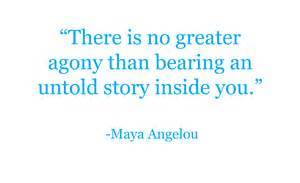
By taking responsibility for your life, you can get rid of stress, sleep better, eliminate anxiety, and relieve depression, increase intelligence, creativity, confidence and energy. Nothing outside yourself will ensure your happiness; there is nothing you can buy or no pill you can take.Success is a process, with ever increasing improvements to your confidence as an author.
It will get easier. Things will begin to happen. You will become open to new ideas and become aware of opportunities that will help give you the motivation and belief to keep moving towards bigger and better things.
- Pay attention to other areas of your life that have changed for the better because of your passion for writing.
- Respect yourself for taking the time to getting it right.
- You do not have to be perfect because you learn invaluable lessons from your mistakes.
- You are a constructive member of the economic community.
- Be a role model for your children.
- You can ask for help if you need it, without being ashamed or embarrassed.
- Like-minded people will naturally be drawn to you, because of your positive attitude.
- Recognise that all blessing come in all shapes and disguises.
Talk soon,
x Michelle
www.michelleworthington.comwww.michelleworthington.com
Published on November 02, 2015 09:00
November 1, 2015
Happy Picture Book Ideas Month #PiBoIdMo
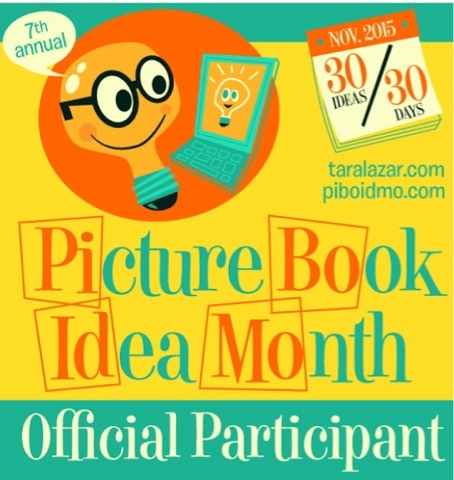
I'm very excited once again to be participating in PiBoIdMo internationally. I'm looking forward to tapping into the global focus on picture book ideas and will be blogging about the need for diversity, updated thinking and new voices.
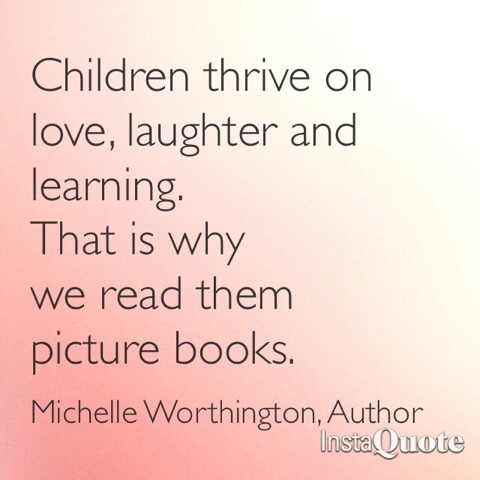
Picture book ideas come from anywhere and everywhere. Picture books are magical, not only because they show the world as it truly is, but how it could be.
Talk soonX Michelle
www.michelleworthington.com
www.michelleworthington.com
Published on November 01, 2015 13:31
GenreCon Brisbane 2015
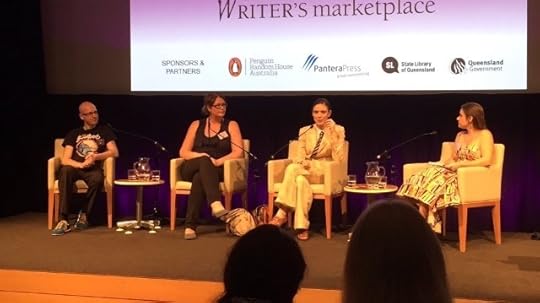
Today I chaired a panel on finding and keeping readers via social media with C S Pacat, J M DDonellan and Kylie Kaden, at the 2015 GenreCon Convention at the State Library of Queensland. We have such an amazing community of writers in Brisbane and festivals are important to connect and recharge creatively.
If you attended the panel, I would love some feedback on how you feel it went!
Looking forward to hearing from you,Michelle www.michelleworthington.comwww.michel...
Published on November 01, 2015 13:31
October 29, 2015
Dear Millionaires...love from a Picture Book Author
 Dear Millionaires,
Dear Millionaires,First let me say I am so genuinely happy for you that you are a millionaire. Someone has to be. Sadly, I am not, yet. I am an author of picture books. Please be advised that one day I hope make enough money from the sale of my picture books and subsequent social engagements that I too will become a millionaire. When you stop laughing hysterically, please consider the possibility.
As I earn 5% of the RRP for the sale of my picture books, I only have to sell 1,333,333 approximate copies to become a millionaire. With the fabulous marketing support I get from big chain bookstores, this wont take long.
Social media is such a blessing and with the rate my Google Ads are delivering returns, I would have made a million by 2050. Before you know it, we will be rubbing shoulders!
Picture books are a solid commodity, with the rise in people reading to their children at night and all the disposable income they have to buy them, what better industry to invest my precious time?
So next time you are shopping on Rodeo Drive, or dining at the Ritz, let them know I shall be along directly. Keep a seat warm for me, my millions are practically already in the bank.
Sincerest wishes,
Michelle
Picture Book Author
Millionare-in-the-making
Watch this space
www.michelleworthington.com
www.michelleworthington.com
Published on October 29, 2015 09:00
October 28, 2015
Tips for Writing an Outstanding Cover Letter for Submission to
Publishers
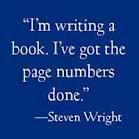 In the competitive world of manuscript submissions, a cover letter can be the difference between your manuscript drowning in the slush pile or being seen by the people who make decisions about publishing. Whether you are submitting by email or post, the cover letter is always the first thing to be considered, making it just as important to be correctly written and edited as your final manuscript. Here are some tips to make your cover letter outstanding.
In the competitive world of manuscript submissions, a cover letter can be the difference between your manuscript drowning in the slush pile or being seen by the people who make decisions about publishing. Whether you are submitting by email or post, the cover letter is always the first thing to be considered, making it just as important to be correctly written and edited as your final manuscript. Here are some tips to make your cover letter outstanding.1. Do not send out generic cover letters to all publishers
Just like authors don't like getting generic impersonal rejection letters, publishers want to know that you have put some time and effort into considering why you are sending your manuscript specifically to them. In the first sentence of your cover letter, pitch yourself as an author in no more than 20 words. The second sentence should be the reason why you have chosen this publisher to submit your work to, whether it is a multiple submission and any other information that will catch the attention of the reader to know this is not just another blind mail out to try and get published. Have you met the editor at a conference? Did you get favourited on a Twitter pitch? What gives you the inside line to being read by the decision makers?
2. Show your credentials
List your published works and any awards received next. If you are a first time author, tell them why you are writing this book and what real life experience you have to back your story. Don't say you read it to your kids and they loved it, or your neighbour, or your dog. You have to show you are a professional in your field and can market your story within your established network. Don't fake it till you make it, be real about what you are bringing to the table to avoid embarrassment down the track.
3. Show your network
Do you regularly attend writers groups or are you a member of writing societies? Do you have a network of people already in place who will support you once your book is published? If your book is about a specific subject, are you a member of an interest group who will already be willing to buy your book? You know more people than you think. This will help them make a decision about whether you are in a position to get the publisher a return on their investment.
4. Your story
Perfect a short pitch about your manuscript, not a blurb or synopsis. If someone asked you what your book was about and you had 10 seconds to tell them and make them interested enough to buy the book, what would you say? Then go into more detail about word count, target audience and background story or illustration notes. This shouldn't be the biggest paragraph of the letter. The reader will decide for themselves and sometimes you can put them off by slanting a story in a certain way that would make them less interested than if they had just read it themselves. Sell your book here.
5. Thank you
Don't forget to say thank you, and mean it. Write a note to say you appreciate their time, again mentioning why you are sending the story to them and how you hope to hear from them at their convenience.
6. Contact details
So many people forget to list their contact details. If they love it, how can they contact you? Also list all the social media sites you can be contacted on. Publishers will google you so it's best if they go to sites you control rather than googling at random and finding some information you weren't aware existed. Google yourself regularly to make sure everything is in order.
I hope you have found my tips for writing an outstanding cover letter helpful. Here are all my contact details if you would like to stay in touch or contact me with any specific questions about getting published.
Talk soon
x Michelle
www.michelleworthington.com
https://www.facebook.com/michelleworthington.author
https://twitter.com/michelle_author
https://au.linkedin.com/in/michelleworthingtonauthorwww.michelleworthington.com
Published on October 28, 2015 08:00
Tips for Writing an Outstanding Cover Letter for Submission to Publishers
 In the competitive world of manuscript submissions, a cover letter can be the difference between your manuscript drowning in the slush pile or being seen by the people who make decisions about publishing. Whether you are submitting by email or post, the cover letter is always the first thing to be considered, making it just as important to be correctly written and edited as your final manuscript. Here are some tips to make your cover letter outstanding.
In the competitive world of manuscript submissions, a cover letter can be the difference between your manuscript drowning in the slush pile or being seen by the people who make decisions about publishing. Whether you are submitting by email or post, the cover letter is always the first thing to be considered, making it just as important to be correctly written and edited as your final manuscript. Here are some tips to make your cover letter outstanding.1. Do not send out generic cover letters to all publishers
Just like authors don't like getting generic impersonal rejection letters, publishers want to know that you have put some time and effort into considering why you are sending your manuscript specifically to them. In the first sentence of your cover letter, pitch yourself as an author in no more than 20 words. The second sentence should be the reason why you are chosen this publisher to submit your work to, whether it is a multiple submission and any other information that will catch the attention of the reader to know this is not just another blind mail out to try and get published. Have you met the editor at a conference? Did you get favourite on a Twitter pitch? What give you the inside line to being read by the decision makers?
2. Show your credentials
List your published works and any awards received next. If you are a first time author, tell them why you are writing this book and what real life experience you have to back your story. Don't say you read it to your kids and they loved it, or your neighbour, or your dog. You have to show you are a professional in your field and can market your story within your established network. Don't fake it till you make it, be real about what you are bringing to the table to avoid embarrassment down the track.
3. Show your network
Do you regularly attend writers groups or are you a member of writing societies? Do you have a network of people already in place who will support you once your book is published? If your book is about a specific subject, are you a member of an interest group who will already be willing to buy your book? You know more people than you think. This will help them make a decision about whether you are in a position to get the publisher a return on their investment.
4. Your story
Perfect a short pitch about your manuscript, not a blurb or synopsis. If someone asked you what your book was about and you had 10 seconds to tell them and make them interested enough to buy the book, what would you say? Then go into more detail about word count, target audience and background story or illustration notes. This shouldn't be the biggest paragraph of the letter. The reader will decide for themselves and sometimes you can put them off by slanting a story in a certain way that would make them less interested than if they had just read it themselves. Sell your book here.
5. Thank you
Don't forget to say thank you, and mean it. Write a note to say you appreciate their time, again mentioning why you are sending the story to them and how you hope to hear from them at their convenience.
6. Contact details
So many people forget to list their contact details. If they love it, how can they contact you? Also list all the social media sites you can be contacted on. Publishers will google you so it's best if they go to sites you control rather than googling at random and finding some information you weren't aware existed. Google yourself regularly to make sure everything is in order.
I hope you have found my tips for writing an outstanding cover letter helpful. Here are all my contact details if you would like to stay in touch or contact me with any specific questions about getting published.
Talk soon
x Michelle
www.michelleworthington.com
https://www.facebook.com/michelleworthington.author
https://twitter.com/michelle_author
https://au.linkedin.com/in/michelleworthingtonauthorwww.michelleworthington.com
Published on October 28, 2015 08:00
October 27, 2015
Transitioning Literacy from Social Media to the Classroom
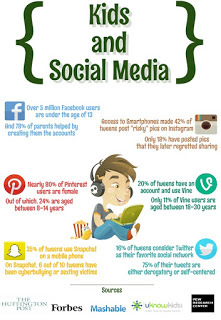 Our kids are using social media. In some cases, it is their first introduction to literacy. Literacy is always surrounded by modern values, customs and influences from the interactions of people in their social network. Social media reflects our roles and relationships. Literacy is a form of behaviour that always takes place within these roles and relationships in social and cultural context. The language used on social media influences our children's language, way of thinking, feelings, values and actions within their social network.
Our kids are using social media. In some cases, it is their first introduction to literacy. Literacy is always surrounded by modern values, customs and influences from the interactions of people in their social network. Social media reflects our roles and relationships. Literacy is a form of behaviour that always takes place within these roles and relationships in social and cultural context. The language used on social media influences our children's language, way of thinking, feelings, values and actions within their social network.
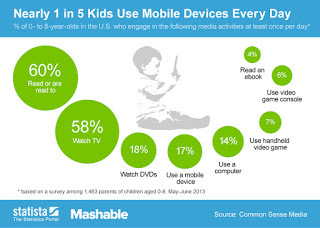 The way language is used online is different to the way it is used in the classroom and this is where kids can struggle. Parents need to be aware of the similarities and differences in order to help their child transition smoothly and succeed at school. Social media use at home has the potential to both help and hinder our kids at school.
The way language is used online is different to the way it is used in the classroom and this is where kids can struggle. Parents need to be aware of the similarities and differences in order to help their child transition smoothly and succeed at school. Social media use at home has the potential to both help and hinder our kids at school.
 Social media has a language specific to a particular context and understandable only to people within that context. Chidlren may not have learnt that meaning varies according to who is reading, when and where they are reading and for what reason. They are not aware of the concept of multiple meanings that vary according to social, cultural and personal differences. Social media can often depict a one-dimensional view of the way things are in the world without the benefit of a critical mind or personal experience to put things in perspective. A good teacher will help children create subjectivity when using social media, a way of looking at the world that isn't so black and white. We all need to challenge the 'I read it on the internet so it must be true' mentality that is emerging in our kids. Parents can help children transition by explaining the process of questioning and analysis that happens at school and getting them exited about learning that seeing things with a different point of view is an important part of why we go to school. We need to recruit our kids to think subjectively about literacy because they are the next generation of world changers. Talk soonx Michellewww.michelleworthington.com
Social media has a language specific to a particular context and understandable only to people within that context. Chidlren may not have learnt that meaning varies according to who is reading, when and where they are reading and for what reason. They are not aware of the concept of multiple meanings that vary according to social, cultural and personal differences. Social media can often depict a one-dimensional view of the way things are in the world without the benefit of a critical mind or personal experience to put things in perspective. A good teacher will help children create subjectivity when using social media, a way of looking at the world that isn't so black and white. We all need to challenge the 'I read it on the internet so it must be true' mentality that is emerging in our kids. Parents can help children transition by explaining the process of questioning and analysis that happens at school and getting them exited about learning that seeing things with a different point of view is an important part of why we go to school. We need to recruit our kids to think subjectively about literacy because they are the next generation of world changers. Talk soonx Michellewww.michelleworthington.comwww.michelleworthington.com
Published on October 27, 2015 08:00
October 26, 2015
Picture Books for Older Readers
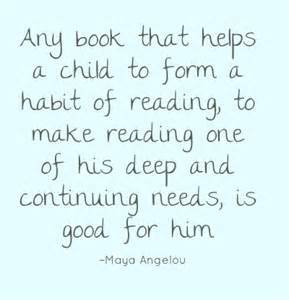 There is a huge hole in the children's picture book market that some publishers are either unaware of or reluctant to fill. With the evolution of modern literacy, the visual nature of the next generation of readers and the difficulty faced by teachers and parents to promote independent reading in children, there is an amazing opportunity to engage older readers with picture books.
There is a huge hole in the children's picture book market that some publishers are either unaware of or reluctant to fill. With the evolution of modern literacy, the visual nature of the next generation of readers and the difficulty faced by teachers and parents to promote independent reading in children, there is an amazing opportunity to engage older readers with picture books.I don't mean books about farm animals, trucks and tractors or fairy woodland creatures, even though I love reading and writing them and there absolutely is a place for them in the right context, but picture books for older readers that introduce topics such as cultural diversity, domestic violence, death of a loved one, global warming, natural disasters and an infinite number of older concepts that don't translate well into books for younger readers. Authors who have seen this need and have books of this genre are finding their only course is to self-publish with varied levels of success.
Picture books absolutely have a place in middle and senior school, not only to encourage children who are still struggling to transition to chapter books with no visual stimulus but to promote the amazing potential that picture books have of engaging groups of readers at once and initiating group discussion and debate. In this genre, books such as The Little Refugee by Anh Do and Flood by Jackie French have had amazing success in the educational market.
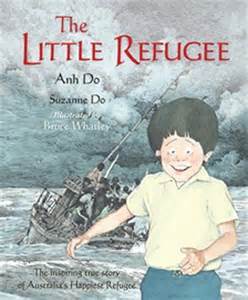
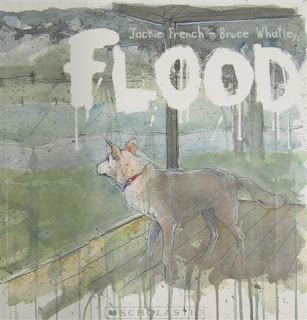
There is huge potential for this emerging authors in this new and lucrative market, if only publishers would take a chance and see the potential for diversity and learning instead of worrying about the bottom line. How many kids are not becoming life long readers because we have failed to engage them at a critical junction in their reading lives? Publishers need to take the initiative and become a world leader in an emerging field of children's literature. We have the talent to back them up.
Talk soon
x Michelle
www.michelleworthington.com
Published on October 26, 2015 08:00



